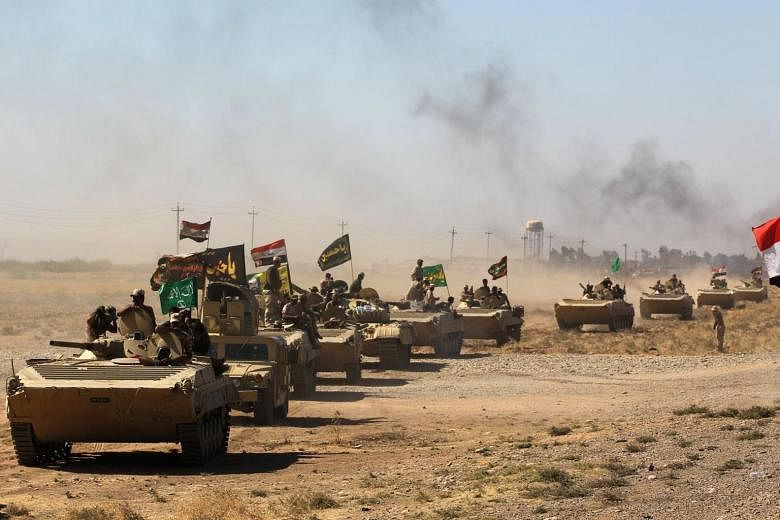KIRKUK, Iraq (WASHINGTON POST) - Iraqi forces have retaken the town of Hawija from ISIS, Iraq's prime minister said on Thursday (Oct 5), though fighting continued in pockets of the last significant urban territory controlled by the group.
Prime Minister Haider Abadi made the announcement from Paris where he was meeting with French President Emmanuel Macron to discuss a growing crisis over an independence referendum held by Iraq's Kurds.
Macron offered to mediate between the Iraqi central government and the Kurds as other regional powers have taken steps to isolate the Kurdish region in retaliation for last week's vote.
Macron, whose country has been a traditional proponent of Kurdish self-determination, said Iraq's territorial integrity must be maintained - dashing hopes by Kurdish officials that France would become one of the few countries to support their recent bid for independence.
Hawija, about 225km north of Baghdad, marked an important test of military coordination between Kurdish peshmerga forces and Iraqi government troops.
The town is in Kirkuk province, an oil-rich region that is hotly disputed by both Arabs and Kurds and has been a focal point in decades-long discord between Baghdad and Kurdish leaders over borders.
The United States has opposed the Kurdish referendum, saying it would threaten cooperation between Iraqi and Kurdish forces in the fight against the Islamic State in Iraq and Syria (ISIS) at a time when the extremist group is reeling from consecutive military defeats.
Hawija was a strategic position for ISIS, giving it a base in central Iraq to launch attacks in surrounding provinces. The battle to reclaim the town was launched on Sept 21 and involved a mix of Iraqi forces backed by American airstrikes.
The battle for Hawija was one of the few remaining areas in which Iraqi and Kurdish parties were cooperating.
Last week, the Kurdish Regional Government held a unilateral referendum on independence, which was approved by nearly 93 per cent of voters in the semiautonomous Kurdish region of northern Iraq.
The vote was opposed by the Iraqi central government, the US, Turkey and Iran. It has set off a string of recriminations and threats of total economic blockade of the Kurdish region by Iraq, Turkey and Iran - all of which have held military exercises as a warning to Kurdish officials.
Turkish President Recep Tayyip Erdogan told Turkish media Thursday that Turkey, Iran and Iraq would decide together whether to choke off the flow of oil from the Kurdish region.
The Popular Mobilization Forces, an umbrella group of militias aligned with the Iraqi government, have strongly opposed the Kurdish independence referendum as well. They participated in the Hawija battle, putting them in close proximity to Kurdish peshmerga forces and raising fears of clashes between the groups.
In a joint news conference with Macron on Thursday, Abadi said there is no "military option" to resolve the dispute between Baghdad and the Kurdish Regional Government.
The relatively swift fight in Hawija has mimicked August's battle for the northern city of Tal Afar, where the militants put up mild resistance before surrendering or withdrawing, Iraq's military said.
Both battles mark a dramatic turnaround in the militant group's ability to hold ground and inflict significant damage. Iraqi and US officials involved in the campaign to eradicate the group say ISIS was exhausted and severely depleted during the gruelling nine-month battle for Mosul, the largest city in northern Iraq and the most important territory the militants held after their 2014 sweep of northern and central Iraq.
Coupled with ongoing battles to evict the group from the Syrian cities of Raqqa and Deir al-Zour, ISIS is under immense military pressure and has ceded roughly 90 per cent of the territory it once controlled.
In Iraq, the group now controls only a string of small towns in the vast desert of western Anbar province along the Syrian border. Iraqi forces launched a campaign there last month and expect a tough fight in an area that is difficult to control and where the militants can move easily between the two countries.
It is in that porous frontier region that US and Iraqi officials believe the group's leader, Abu Bakr al-Baghdadi, is hiding. Last week, ISIS released an audio recording purporting to be of Baghdadi - defying Russian claims that the reclusive leader was killed over the summer.

